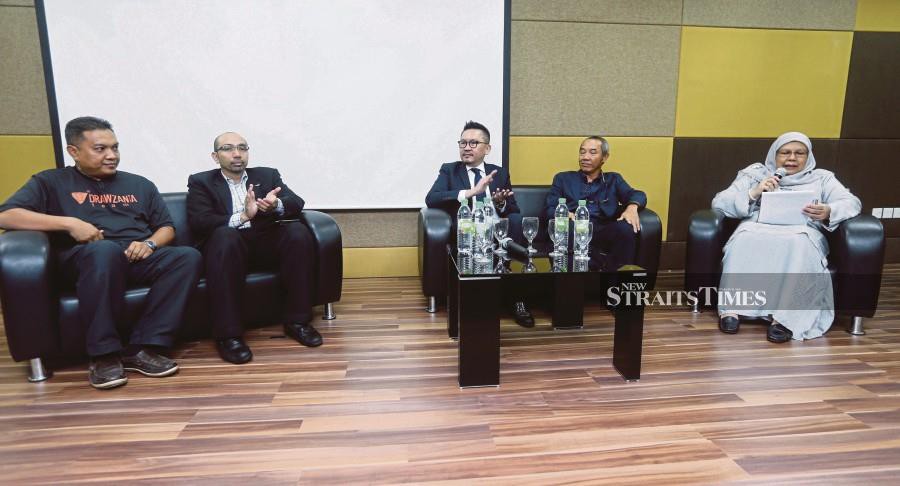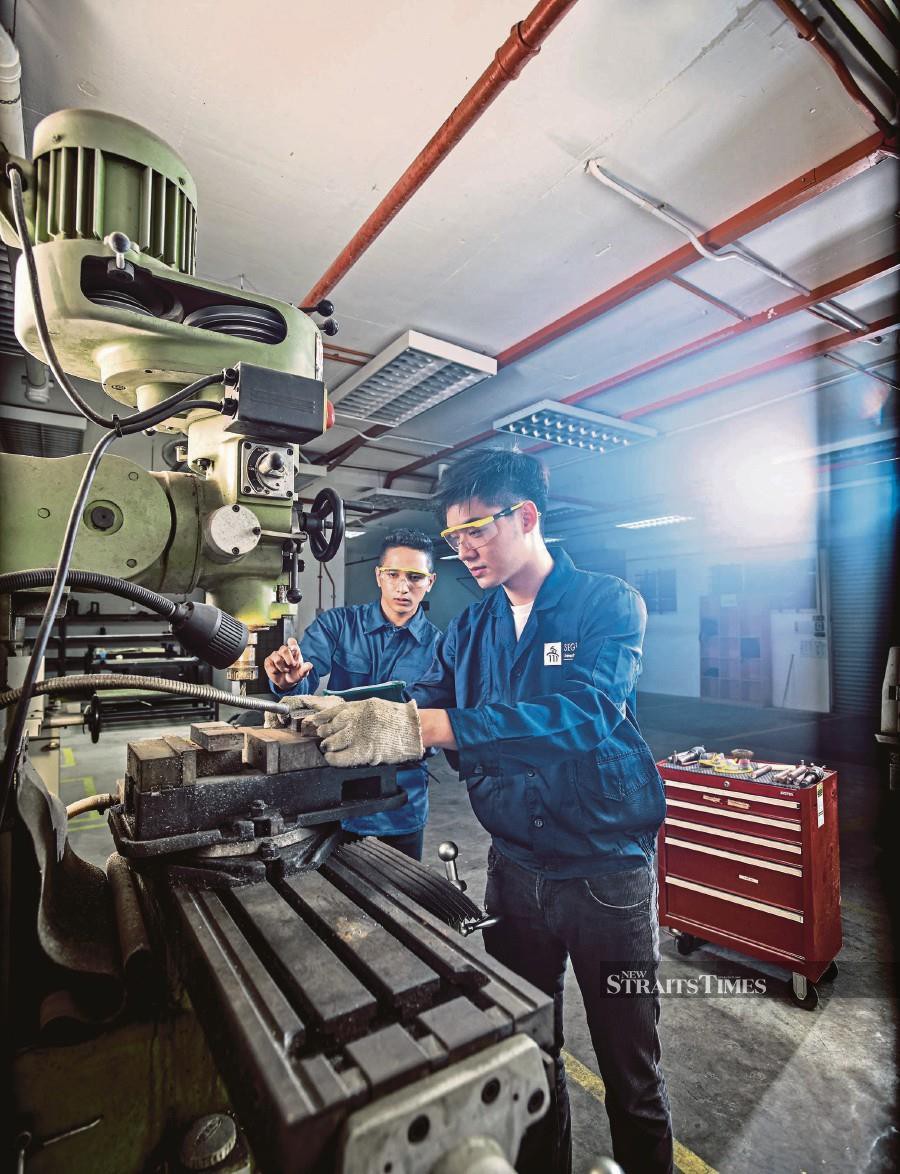ARE Malaysian graduates ready to face challenges at the workplace? Are they innovative and equipped with communication and problem-solving skills? Can they carry out tasks independently at the workplace?
Many fresh graduates are stunningly ill-prepared for the workforce, without realising it.
Industry players look for fresh recruits who possess critical thinking skills and breadth of knowledge that comes from understanding not only how to perform a given task, but the reasoning behind it.
But employers in the country generally feel there is a gap in graduate skills, suggesting that universities do not necessarily provide enough opportunities for students to develop abilities critical to the labour market.
Low proficiency in the English language and lack of soft skills including creativity, communication and critical thinking are among the reasons fresh graduates not ready to enter the workforce.
The recent STEM Forum, titled Graduates and Employment: Are They Ready from the Industry Perspective?, organised by Universiti Malaya STEM Centre, saw a group of panellists from the industry voicing their concerns that many Malaysian graduates are still unprepared to join the labour market.
ISSUES
Drawzania.com founder and chief executive officer Dr Ruzaimi Mat Rani said most Malaysian students are not ready to face challenges at the workplace, based on his experience with the graduates who attended his freehand visualisation communication skill (FVCS), creativity and innovation in organisation workshop.
FVCS is a programme formulated to cater to the needs of an individual and organisation to be more effective in daily communication skills.
The workshop attracted more than 3,000 participants but less than 10 per cent were able to draw with visualisation skills.
“It was easy when I asked them to draw a pot of flowers. But they were not able to draw their dream house,” added Ruzaimi.
But what is the link between FVCS and employability of graduates?
“FVCS is essential to be acquired by all to increase individual and organisation productivity. Without it, you are less effective in your daily communication.
“Imagine you’ve been hired but what’s next? You have to ‘create’,” he added, referring to the highest rank of Higher Order Thinking Skills, which is the fundamental skill.
The most common challenge graduates face is communication, especially during the job interview and at the workplace.
“About 75 per cent of project management fail because of communication. Graduates should be able to communicate well, which is a basic requirement at an interview. Communication skills are crucial when they enter the workforce.”
Strand Aerospace Malaysia principal consultant Dr Rahmat Shazi said he prepares human capital for high value industries, not just aerospace but also other sectors meant to be established or expanded in the country.
Last year after the company interviewed 700 graduates, not only from local universities but also from across the globe which included candidates from Russia, Indonesia and the United States, it came across multiple issues related to readiness to work.
“Most of our graduates can’t even visualise what they want to say, hence the failure to put the message across.
“This is due to lack of high cognitive skills such as attention, memory and logical reasoning,” said Rahmat.
Industry players believe that fresh graduates should first nail the job interview. It is important for employers to find out the strength and capabilities of the candidates before hiring them.
The job interview itself prepares them for the workplace.
BMW Quill Automobiles hiring manager Alex Tang Chee Keong said many Malaysian graduates are ready on paper, which means they only have good academic qualifications.
But the reality is, he added, many do not know anything about the industry.
“Graduates need to equip themselves with relevant knowledge. Ask yourself what you can contribute. That’s what employers want.
“For example, if I hire a fresh graduate, I expect him to at least be familiar with and understand the industry that he wants to join.
“However, many of them don’t do their research or visit the company website and learn its core brand value.
“I advise graduates to read to increase general knowledge. It doesn’t matter if it’s a book, a magazine or newspaper,” added Tang.
Consultant Hishamuddin Mohamed at Strategic Swiss Partners, a leading boutique management and financial advisory firm, said fresh graduates need to step up, especially if they are seeking a job in a multinational corporation.
“Bear in mind that you are among many job seekers applying for one position. So you have to make a good first impression, otherwise you’re going to be just another number.
“Graduates have their resumes but is the university preparing them for effective employment and better work opportunity?”

WORK-READY
Tertiary institutions today must be able to play multiple roles in preparing undergraduates for the future.
SEGi University vice-chancellor Professor Dr Patrick Kee Peng Kong said in view of Industry Revolution 4.0 (IR 4.0), the university continues to update its programmes and collaborate with industry leaders to ensure its academics and students are IR 4.0-ready.
“To produce industry-relevant graduates, we focus on a student-centred environment where students are provided with opportunities to interact and work with industry partners on their assignments and projects, and have access to advanced laboratories and workshops with essential tools to develop their skills.
“We also ensure that students gain exposure to the real-life work environment so that their transition into the industry is as seamless as possible through programmes such as Employment Readiness, Enrichment and Aspiring Club Leadership and Personal Professional Development. They also hone their soft skills via hands-on courses,” added Kee.
Taylor’s University deputy vice-chancellor and chief academic officer Professor Dr Pradeep Nair believes that higher education goes beyond just ensuring that graduates are industry-ready.
He said the core responsibility of a university is to ensure graduates are equipped with the right job skills to start their career, however, more importantly, the institution needs to equip them with life skills and emotional well-being to lead a successful and happy life.
“Being very good in one’s job-related knowledge and skills without life skills and social intelligence is the reason companies keep saying that graduates aren’t prepared for the workforce.
“For example, an aeronautical engineer may know everything about designing and maintaining an aircraft or its propulsion systems, but it will be his communication skills, creativity, resilience, ability to work with diverse teams, agility in adapting to different situations and cultural contexts, and take risks, among other qualities that will help him secure a good job and grow in the organisation,” added Pradeep.
CHANGING CURRICULA
Is the curriculum at the university ready for IR 4.0?
Kee said universities globally have moved away from textbook- and classroom-based learning into a blended environment, with trends pointing towards research- and project-centric approaches.
Programmes have become industry-driven and flexible, forcing tertiary institutions to constantly review their courses, curricula and methodologies.
“As industries worldwide are facing a digital economy disruption, the education industry is in a prime position to make a difference by shifting its focus and approaches.
“The government is well aware of this scenario, which is why the Malaysia Education Blueprint (2015-2025) places emphasis on flexible and skill-based learning and greater hands-on exposure.
“It is common practice for tertiary institutions to review and revise their curricula based on industry needs and practices, failing which they will be deemed irrelevant.
“After all, we are in the business of preparing human capital for various industries and it will defeat our purpose if we fail to revise, reinvent or innovate.
“However, it depends on the nature of the industry. With IR 4.0, we know that certain fields such as information technology, computing and engineering must be reviewed continuously while all other programmes, periodically.”
Deloitte’s Global Second Annual Report on IR 4.0 Readiness reveals that as the revolution gains momentum, there is a higher disparity in talent match.
C-suite executives who participated in the survey have raised concerns over the slow-paced evolution of the current education system.
“In fact, 57 per cent say the education system needs to be redesigned. While they were referring to the public education system, we believe private institutions also play an equally important role in producing industry-competent graduates, especially in growing economies like ours,” added Kee.
However, Pradeep said the university has to ensure that any major change in curriculum conforms to the Code of Practice for Programme Accreditation and programme standards issued by Malaysian Qualifications Agency (MQA) as well as the requirements set by professional bodies, where applicable.
“There is nothing stopping a university from innovating its programme curriculum and engaging with accreditation bodies to accept and allow such change,” he added.
Once Taylor’s University has obtained approval from MQA, it will introduce work-based learning opportunities as part of its curriculum from next year onwards.
“Currently, we have restructured three degree programmes to be offered in a work-based learning mode. This is really exciting as students will have the option to spend their third and final year in select companies of their choice.
“This is real world learning and will certainly help bridge the university-industry gap. Our students will not need to pay extra for this as it has been incorporated as part of their tuition fees.”
CHALLENGING TASKS
While a decision for a curriculum overhaul typically comes from the management, it needs to involve the academics at every step.
Pradeep said academics are inherently intellectuals and listen to data-driven arguments for change. Benchmarking top universities in the US and Australia, for example, helps convince them that this is possible.
“Engaging professional and accreditation bodies is also key as many approaches are not yet common practice in our country.
“Adopting technology in learning and teaching must be preceded by technology that works. We introduced blended learning to enable students to have a platform to learn on-the-go, to be mobile and flexible in their acquisition of knowledge.
“This allows them to develop life skills such as communication, critical thinking, emotional intelligence and flexibility. Our experience has been that industry players in Malaysia and Asia welcome our students to spend time learning with, and from, them — at no additional cost to the industry.
“Through this, our students are able to apply for internships with leading brands so they obtain valuable work experience that sets them apart from their peers. These work placement opportunities take some of our students overseas as well.”
Kee, on the other hand, said the ever-changing business environment requires the university to change the way it teaches, what more with the advent of IR 4.0 where artificial intelligence is phasing out certain jobs.
“We face a highly competitive industry with lack of subject matter experts to teach the relevant and new subjects.”





